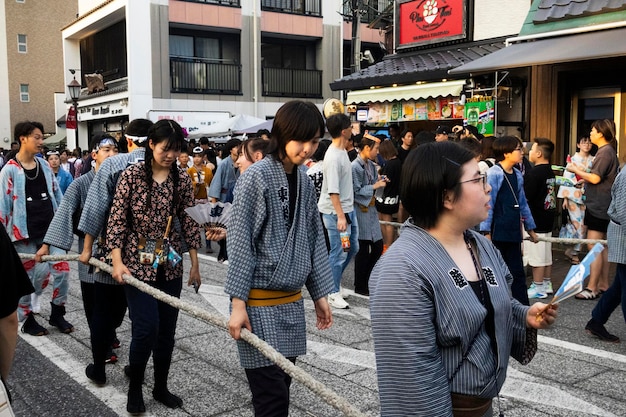Mastering Japanese Bargaining: A US Shopper’s Guide

Mastering Japanese bargaining involves understanding cultural nuances, using polite language, researching prices beforehand, being willing to walk away, and building rapport with vendors for a successful negotiation in Japanese markets.
Navigating the vibrant markets of Japan can be an exciting experience for any US shopper, but mastering the art of bargaining requires a blend of cultural sensitivity and strategic negotiation. This guide will equip you with the knowledge and skills to confidently engage in mastering Japanese bargaining, ensuring you get the best deals while respecting local customs.
Understanding the Japanese Approach to Bargaining
Bargaining in Japan is often different from what you might expect in other countries. While it’s not as widespread as in some cultures, knowing when and how to negotiate can lead to significant savings, especially in local markets and smaller shops.
The Japanese value politeness and respect, so it’s crucial to approach bargaining with the right attitude. This involves being respectful of the vendor, using appropriate language, and understanding the cultural context of the situation.
The Role of Politeness and Respect
In Japan, politeness goes a long way. Starting with a friendly greeting and using polite language throughout the negotiation can significantly impact the outcome. Avoid being aggressive or demanding, as this can be seen as rude and counterproductive.
- Use honorifics when addressing vendors (e.g., “-san” after their name).
- Maintain a calm and respectful tone throughout the conversation.
- Express gratitude for their time and consideration, regardless of the outcome.

When Bargaining is Appropriate
Knowing when it’s acceptable to bargain is just as important as knowing how to do it. Bargaining is more common in smaller, independent shops and markets, particularly those selling souvenirs, crafts, and fresh produce. It’s less common in department stores and larger retail chains.
Don’t expect to bargain in upscale boutiques or established department stores. Instead, focus your efforts on smaller shops and markets where vendors have more flexibility in pricing. Asking “Makete moraemasu ka?” (Can you give me a discount?) politely can open the door to negotiation.
In conclusion, understanding the cultural nuances and appropriate contexts for bargaining lays the foundation for a successful negotiation in Japan. Politeness, respect, and knowing when to ask for a discount are key to getting the best deals.
Preparing for a Successful Bargaining Experience
Before you head to the market, a little preparation can go a long way in ensuring a successful bargaining experience. This includes researching prices, setting a budget, and familiarizing yourself with useful Japanese phrases.
By taking the time to prepare, you’ll be better equipped to negotiate confidently and effectively, maximizing your chances of getting a good deal while respecting local customs.
Researching Prices and Setting a Budget
Knowing the average price of the items you’re interested in is crucial for determining whether you’re getting a fair deal. Research prices online or visit multiple shops to get a sense of the market rate. Set a budget for each item to avoid overspending and to guide your negotiation.
Essential Japanese Phrases for Bargaining
Learning a few basic Japanese phrases can make a big difference in your bargaining efforts. Not only will it show respect for the local culture, but it will also help you communicate your needs and negotiate more effectively.
- “Sumimasen” (Excuse me) – Use this to get the vendor’s attention politely.
- “Kore wa ikura desu ka?” (How much is this?) – A fundamental phrase for inquiring about the price.
- “Takai desu ne” (That’s expensive) – A polite way to express that the price is too high.
Equipping yourself with the right knowledge and language skills sets the stage for a successful and respectful bargaining experience in Japan. Researching prices and learning key Japanese phrases are essential steps in this preparation process.
Strategies for Negotiating Prices in Japanese Markets
Once you’re at the market, there are several strategies you can use to negotiate prices effectively. These include building rapport with the vendor, starting with a reasonable offer, and being willing to walk away.
Remember, the goal is to reach a mutually agreeable price while maintaining a friendly and respectful demeanor. With the right approach, you can often secure a better deal without compromising your values.
Building Rapport with Vendors
Establishing a positive relationship with the vendor can make a big difference in the negotiation outcome. Take the time to chat with them, show genuine interest in their products, and be friendly and approachable.

Making a Reasonable Offer
When making an offer, start with a price that is lower than what you’re willing to pay, but not so low that it’s insulting. A good starting point is around 20-30% below the asking price. Be prepared for the vendor to counteroffer, and adjust your offer accordingly.
- Always be respectful and polite when making an offer.
- Be prepared to explain why you’re offering a lower price.
- Be flexible and willing to compromise to reach a mutually agreeable price.
Mastering the art of negotiation involves striking a balance between assertiveness and respect. Building rapport and making reasonable offers are key components of a successful bargaining strategy in Japanese markets.
Common Mistakes to Avoid When Bargaining in Japan
While bargaining can be a rewarding experience, there are several common mistakes that US shoppers should avoid. These include being overly aggressive, misunderstanding cultural etiquette, and focusing solely on price.
By being aware of these pitfalls, you can avoid causing offense and ensure a more positive and successful bargaining experience.
Being Overly Aggressive or Demanding
One of the biggest mistakes you can make when bargaining in Japan is being overly aggressive or demanding. This type of behavior is considered rude and disrespectful, and it’s unlikely to get you a good deal. Instead, maintain a calm and polite demeanor throughout the negotiation.
Avoid raising your voice or making demands. Instead, express your needs and concerns respectfully and be open to compromise. Remember, the goal is to reach a mutually agreeable price, not to win at all costs.
Misunderstanding Cultural Etiquette
Another common mistake is misunderstanding Japanese cultural etiquette. This can include everything from using inappropriate language to engaging in behavior that is considered impolite. For example, pointing directly at someone or something can be seen as rude.
Take the time to learn about basic cultural customs and etiquette before you go shopping. This will help you avoid causing offense and ensure a smoother and more pleasant experience. When in doubt, err on the side of caution and be as respectful as possible.
Avoiding common pitfalls and cultural misunderstandings is crucial for a positive and successful bargaining experience in Japan. By being mindful of your behavior and respecting local customs, you can ensure a smoother and more pleasant negotiation.
Alternative Shopping Experiences in Japan
While mastering bargaining can be fun, Japan also offers a variety of alternative shopping experiences that don’t involve negotiation. These include visiting department stores, exploring traditional craft shops, and attending local festivals.
By exploring these different options, you can gain a deeper appreciation for Japanese culture and find unique and memorable souvenirs to take home.
Visiting Department Stores
Department stores in Japan offer a wide range of products, from high-end fashion to household goods. While bargaining is not typically practiced in these stores, they often have sales and promotions that can offer significant savings.
Department stores are known for their excellent customer service. Take advantage of the knowledgeable staff who can assist you with finding the perfect item and provide helpful information. Look out for seasonal sales and special events that can offer additional discounts.
Exploring Traditional Craft Shops
Traditional craft shops are a great place to find unique and authentic souvenirs. These shops often sell handmade items such as pottery, textiles, and lacquerware.
- Take your time to browse and appreciate the craftsmanship involved.
- Engage with the artisans and learn about the history and techniques behind their work.
- These items may be more expensive than mass-produced souvenirs, but they offer a unique and lasting reminder of your trip.
Exploring alternative shopping experiences allows you to discover a different side of Japanese culture and find unique and memorable souvenirs. From department stores to traditional craft shops, there’s something for every shopper to enjoy.
Maximizing Your Savings Beyond Bargaining
Beyond mastering bargaining, there are other ways to maximize your savings while shopping in Japan. These include taking advantage of tax-free shopping, using credit cards with travel rewards, and comparing prices across different stores.
By implementing these strategies, you can stretch your budget further and enjoy a more affordable shopping experience without sacrificing quality or experience.
Taking Advantage of Tax-Free Shopping
Japan offers tax-free shopping for tourists on purchases over a certain amount (typically around ¥5,000). Look for shops that display the “Japan Tax-Free Shop” logo and be sure to bring your passport with you to qualify.
The tax refund is typically applied at the time of purchase, so you’ll save money immediately. This is a great way to reduce the cost of souvenirs and other items. Make sure to check the specific requirements and limitations of the tax-free shopping program before you go.
Comparing Prices Across Different Stores
Don’t assume that the first price you see is the best price. Take the time to compare prices across different stores and markets to ensure you’re getting the best deal. This is especially important for larger purchases.
- Use online resources to compare prices before you go shopping.
- Visit multiple shops and markets to get a sense of the market rate.
- Be willing to walk away if you can’t find a price that you’re comfortable with.
Maximizing your savings involves exploring various strategies beyond bargaining. Tax-free shopping and price comparison can significantly reduce your expenses and enhance your overall shopping experience in Japan.
Conclusion
Armed with these tips, the US shopper can approach mastering Japanese bargaining with confidence. Remember to be respectful, polite, and patient, and you’ll not only get a good deal but also enjoy a more authentic and rewarding cultural experience.
| Key Point | Brief Description |
|---|---|
| 🤝 Politeness | Respectful communication improves negotiation outcomes. |
| 💰 Research Prices | Understanding market value ensures fair negotiations. |
| 🇯🇵 Useful Phrases | Knowing basic Japanese aids communication. |
| 🚶 Walk Away | Be prepared to leave if terms aren’t acceptable. |
Frequently Asked Questions
Bargaining isn’t as widespread as in some cultures, but it’s acceptable in local markets and smaller shops, particularly for souvenirs, crafts, and fresh produce.
Start with a friendly greeting and polite language. Showing respect for the vendor is crucial. You can politely ask, “Makete moraemasu ka?” (Can you give me a discount?).
“Sumimasen” (Excuse me), “Kore wa ikura desu ka?” (How much is this?), and “Takai desu ne” (That’s expensive) are helpful phrases. Knowing basic Japanese shows respect.
Avoid being overly aggressive or demanding. Misunderstanding cultural etiquette can also be detrimental, so be mindful and respectful of local customs.
Bargaining is less common in department stores. Focus on smaller shops and markets where vendors have more flexibility. Department stores often offer sales instead.
Conclusion
By understanding the cultural context, preparing with essential phrases, and practicing respectful negotiation strategies, US shoppers can successfully engage in bargaining in Japan and discover unique shopping opportunities.





